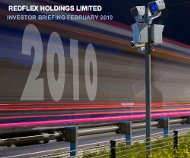2/25/2010
Red Light Camera Giant Redflex Loses $8 Million From OppositionLargest photo enforcement vendor reports that opposition groups have cut into company profits.

The number one speed camera and red light camera operator in the US today reported that its profits plunged by 32 percent in the first half of fiscal 2010, due in large measure to rising public discontent with automated enforcement. Redflex Traffic Systems told Australian shareholders that after adjusting for exchange rates, the company lost A$8 million, primarily as a result of citizen activists taking action against photo enforcement.
"The business, particularly in the US, has become more difficult over recent years, and the results reflect the influence of a range of adverse issues and circumstances on the business, including... the rise of opposition from various groups opposed to photo enforcement, resulting in challenges to programs through citizen initiated referenda," a company statement explained. "A state wide ballot initiative [in Arizona] could result in negative impact."
To date, citizen groups nationwide have succeeded in putting the question of photo enforcement on the ballot in nine cities. All nine voted to ban automated ticketing, with margins as high as 86 percent against the cameras (view list of cities). The largest citizen-led revolt so far is happening in the state of Arizona where the group CameraFraud.com has used a continual stream of protests, a Facebook page and other techniques to educate drivers that citations mailed from the program could be thrown away, unpaid. Only personally served notices are valid in the state. Redflex reported that the Arizona program so far has lost $4.9 million.
"Citation payment rates remain low due to the inability to achieve acceptable payment rates from violators," the company explained. "Our push to reform the laws governing traffic enforcement with the Arizona Legislature and with the Arizona Supreme Court makes 2010 a critical year for our Company in Arizona.... Once corrective legislation is passed payment rates are expected to rise to the average historical payments rates typical for the Arizona business model."
Discontent with photo ticketing has spread nationwide as politicians fear they may lose their jobs if they are responsible for bringing cameras into their community, although Redflex suggests the recession may also play a role.
"The rate of new contract signings has clearly decreased since a year ago," Redflex admitted. "It is not clear at this stage whether this is driven by the economic environment, by the level of opposition, or by a slowdown in the rate of growth in the industry as a whole."
A number of cities that use Redflex or a competitor have dropped the use of automated ticketing machines entirely in California over the past few years, including Compton, El Monte, Fairfield, Maywood, Moreno Valley, Redlands, Roseville, San Jose photo radar and Upland. Loma Linda is waiting to drop Redflex. Other states are following California's lead as Avondale, Arizona; Schaumburg, Illinois as well as Brunswick and Dalton, Georgia also canceled their programs.
"As has been experienced over prior years, there is no guarantee that all contracts will be renewed at completion of their base contract term," a Redflex statement explained. "Some cities have decided not to continue, and we have experienced early shutdowns in two cities."
The company's other major financial burden has been a lawsuit filed by American Traffic Solutions has cost Redflex another $1.3 million (more info). A shareholder revolt also cost the company $197,000 in expenses related to a change in the board of directors.


